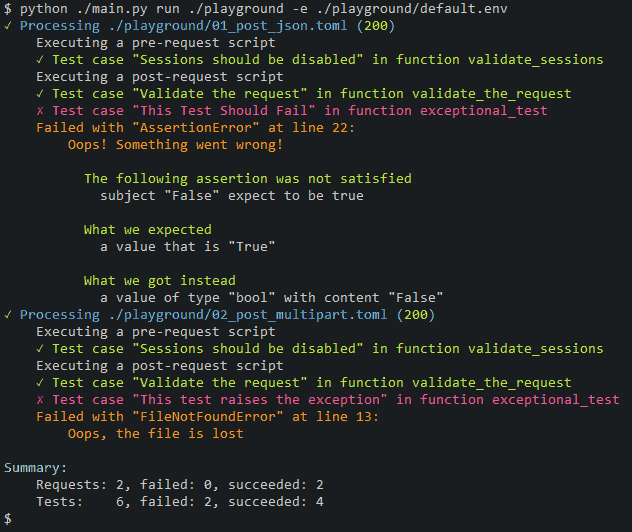PyApiTester Documentation
Welcome to the PyApiTester documentation! If you’re new here, this guide will show you how to use PyApiTester with some handy examples.
What is PyApiTester?
PyApiTester is a small and efficient command-line tool designed for testing backend APIs. Unlike other tools, it keeps things simple without the need for a graphical interface. All your requests are stored in a straightforward text-based format, making it easy to modify them using your favorite text editor.
Features and Advantages
Pros:
-
Compact CLI Application: PyApiTester is a concise Command-Line Interface (CLI) application written in Python.
-
Requests Library Integration: Leveraging the Requests library, PyApiTester supports Python v3.7 and above.
-
Text-based Storage: Requests and environments are stored in a version control-friendly, text-based format (TOML).
-
User-friendly Colored Output: Enhancing readability, PyApiTester provides a visually intuitive colored output.
-
grappa Integration: Seamlessly integrate with grappa for effortless testing.
-
Scripting Capabilities: PyApiTester allows the inclusion of pre- and post-request scripts, enabling the incorporation of Python-based test cases.
-
Exception Handling: Benefit from detailed exception information, facilitating smooth user script debugging.
Cons:
-
CLI Nature: PyApiTester operates solely through the Command-Line Interface. For those preferring a graphical interface, consider exploring Bruno.
-
Python v3.7+ Requirement: Ensure Python v3.7 or a more recent version is installed.
Sometimes, a picture is worth a thousand words. Check out this sample CLI output:

Here’s an example of a post-request script that tests the response:
@test_case("Validate the response")
def validate_the_response():
# You can change 'None' to any other exception type if needed, e.g., 'ConnectTimeout' or 'TooManyRedirects'
expect(res.Exception).to.equal(None)
expect(res.Status).to.be.equal(200)
# You can use any environment variable. Everywhere.
expect(res.Json["json"]["answer"]).to.be.equal(42)
expect(res.Json["json"]["valid"]).to.be.true
expect(res.Time).to.be.less(1000)
# You can define your functions (not test-case) and call them as usual
def test_exception():
# This will always fail
expect(False).to.be.true
# This will never be executed because the line above is executed first
expect(res.Status).to.be.equal(200)
@test_case("This Test Should Fail")
def exceptional_test():
test_exception()
# You can raise any exception if you want
#raise FileNotFoundError("Oops, the file is lost")